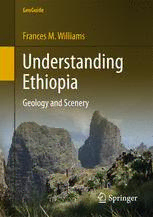
Understanding Ethiopia: Geology and Scenery PDF
Preview Understanding Ethiopia: Geology and Scenery
GeoGuide Frances M. Williams Understanding Ethiopia Geology and Scenery GeoGuide Series editors Wolfgang Eder, Munich, Germany Peter T. Bobrowsky, Burnaby, BC, Canada Jesús Martínez-Frías, Madrid, Spain Axel Vollbrecht, Göttingen, Germany The GeoGuide series publishes travel guide type short monographs focussed on areas and regions of geo-morphological and geological importance including Geoparks, National Parks, World Heritage areas and Geosites. Volumes in this seriesareproducedwiththefocusonpublicoutreachandprovideanintroduction tothegeologicalandenvironmentalcontextoftheregionfollowedbyindepthand colourful descriptions of each Geosite and its significance. Each volume is supplementedwithecological,culturalandlogisticaltipsandinformationtoallow these beautiful and fascinating regions of the world to be fully enjoyed. More information about this series at http://www.springer.com/series/11638 Frances M. Williams Understanding Ethiopia Geology and Scenery 123 Frances M.Williams Department ofEarth Sciences University of Adelaide Adelaide, SA Australia ISSN 2364-6497 ISSN 2364-6500(electronic) GeoGuide ISBN978-3-319-02179-9 ISBN978-3-319-02180-5 (eBook) DOI10.1007/978-3-319-02180-5 LibraryofCongressControlNumber:2015950056 SpringerChamHeidelbergNewYorkDordrechtLondon ©SpringerInternationalPublishingSwitzerland2016 Thisworkissubjecttocopyright.AllrightsarereservedbythePublisher,whetherthewholeor part of the material is concerned, specifically the rights of translation, reprinting, reuse of illustrations,recitation,broadcasting,reproductiononmicrofilmsorinanyotherphysicalway,and transmissionorinformationstorageandretrieval,electronicadaptation,computersoftware,orby similarordissimilarmethodologynowknownorhereafterdeveloped. The use of general descriptive names, registered names, trademarks, service marks, etc. in this publicationdoesnotimply,evenintheabsenceofaspecificstatement,thatsuchnamesareexempt fromtherelevantprotectivelawsandregulationsandthereforefreeforgeneraluse. Thepublisher,theauthorsandtheeditorsaresafetoassumethattheadviceandinformationinthis bookarebelievedtobetrueandaccurateatthedateofpublication.Neitherthepublishernorthe authorsortheeditorsgiveawarranty,expressorimplied,withrespecttothematerialcontained hereinorforanyerrorsoromissionsthatmayhavebeenmade. Printedonacid-freepaper Springer International Publishing AG Switzerland is part of Springer Science+Business Media (www.springer.com) This book is dedicated to the memory of Dr. Bill Morton, friend and colleague, whose contribution to the understanding of Ethiopia’s geology was tragically cut short. Foreword To venture is to enlarge one’s life. To venture into Ethiopia is to encounter a cornucopia of unmatched physical and cultural diversity. Poised high and com- mandingabovetheNileplainstothewest,theRedSealittoraltotheeastandthe Kenyan savannah to the south, Ethiopia’s castellated plateaus have been home, rallying ground and refuge to a two thousand year-long succession of ruling emperors (and empresses!). Ethiopia, today an increasingly powerful influence in Africa,hasanancientnameworthyofthebirthplaceofHomosapiens,expressive ofitshospitalitytotheQueenofShebaandpossiblytheArkoftheCovenant,anda refugeforearlyfollowersoftheprophetMuhammad.Yetthekaleidoscopichuman history of Ethiopia has been conditioned by a far older history, that of its land- scape. For as the author of this book rightly remarks, “In Ethiopia geology lies behind almost every experience”. ThespectacularlandscapeofEthiopiahasbeenmouldedandsculptedbyforces inside the earth which continue to act today: volcanoes simmer in the lowlands, earthquakes episodically open chasmic fissures in Afar, and the Rift Valley con- tinuesslowlybutinexorablytowideninresponsetoongoingcontinentaldrift.At the same time, great rivers impressed on the highlands continue to roar and cut deepintotheirawesomecanyons:theAbay(BlueNile),Tekeze,OmoandShebeli. This is nature alive on the grand scale! FrancesWilliams’loveaffairwithEthiopiastemsfromclosetohalfacentury’s acquaintance with the land and its people. She has travelled it from east to west, northtosouthandpeaktogulf.Asafieldscientist,photographer,linguisticartist, and convivial and sensitive companion, she now expresses in this gem of a book her knowledge of not only the geological tapestry of Ethiopia, but also its archaeology and ancient human cultures. With clarity and, in the best sense, simplicity, she communicates the drama of the moulding of Ethiopia’s geology, both for the novice and for those advanced but still learning! vii viii Foreword Between these covers, the traveller, on the move or at home, can savour and more fully appreciate the remarkable and complex choreography of Ethiopia’s geologicalevolution.Thefirstsectionofthebook,afterintroducingsomeessential geological concepts, describes its 600 million year-long story: from an initial, crunching continental collision; then successively through glaciation near the SouthPole,gentlefloodingbytropicalseas,violentfloodingbygiganticwhite-hot lavaflows;andlastlyandstillongoing,theupliftingofthehighplateauswhileat the same time they are being rifted apart. The second section devotes fifteen chapters to the various geological regions of Ethiopia, well illustrated with col- ourful maps, informative diagrams and photographs that display an artist’s eye. Fortheartistryofgeologyteachesusthatultimately“Itisthebeginningandthe end that shadows the civilisations that pass upon the surface”. Paul Mohr Author of a 1962 “Geology of Ethiopia” Acknowledgments Somanypeoplehavehelpedmewhilepreparingthisbookthatitishardtoknow wheretobeginexpressingmythanks.Iwillthereforedosowheremyassociation with Ethiopia began, with the Department of Geology (now the Department of EarthSciences)atAddisAbabaUniversity.Thankyoutoallitsstaffandstudents, past and present, for giving me the opportunity to work in your department all thoseyearsago,foropeningmyeyestoyourwonderfulcountryandforcontinuing to give me encouragement and support throughout this project. DuringmytripstoEthiopiaoverthepasttenyears,mytravelhasbeenarranged byMr.TonyHickeyandhisteamatEthiopianQuadrants.ThankyoutoTonyand alltheQuadrantsstaff,especiallytoW/oManalebshTilahunandW/oEtagegnehu Bulifororganisingunconventionalitineraries,andtoeverybodyforbeingsmiling and welcoming whenever I come to your office. My very special thanks go to long-distance drivers Ato Mesfin Debrework, Ato Fuad Ahmed, Ato Kassahun EjetaandAtoKassayeYohanneswhoneverdemurredaboutgoingoffthebeaten tracktofollowthestrangewhimsofageologistandforwhosedrivingskillsIhave unceasing admiration. AtoBedassaGubenakindlyarrangedlogisticsfortripstoLakeTana,andtothe Semien Mountains where Ato Yalew Tafete was an indefatigable and knowl- edgeable guide. Chief Warden Ato Maru Biadglegn and his team at the Semien Mountains National Park headquarters at Debarek provided valuable logistical support. Dr.YirmudDenekeandthestaffoftheAwashFallsLodgehavealwaysgiven meawarmwelcomeandprovidedassistanceduringmyvisitstoAwashNational Park. Manychaptersofthebookhavebenefittedenormouslyfromcarefulreviewand criticalcommentsbypeoplewhoaremoreexpertinparticularareasthanIam.My heartfelt thanks go to Professor Ernesto Abbate, Ato Tadesse Alemu, Professor Mohamed Abdelsalam, Emeritus Professor Michael Beyth, Ms. Morgan Blades, ix x Acknowledgments Dr.TadewosChernet,ProfessorAlanCollins,ProfessorGiacomoCorti,Associate Professor Derek Keir, Professor Henry Lamb, Professor Paul Mohr, Mr. Robert NeilMunro,ProfessorDr.JanNyssen,Mr.PeterPurcell,Mr.KeithRawolle,Mrs. JanRawolle,ProfessorSolomonTadesseandDr.JacquesVaretfortakingtimeto read chapters and make constructive comments—and for saving me from some potentially embarrassing errors. I am alone responsible for any errors which remain. Professor Ernesto Abbate, Dr. Zelalem Assefa, Ms. Morgan Blades, Mr. Andrew Dakin, Mr. Emile Farhi, Dr. Lorraine Field, Professor John Foden, Mr.EugenioLizardi, Mr.Robert Neil Munro,Mr.Peter Purcelland AtoKassaye Yohanneskindlypermittedmetousephotographswhichtheyhadtaken.Professor AllanPringoftheSouthAustralianMuseumprovidedthephotographofEthiopian opal and Dr. Deborah Haynes photographed the diatoms for Chap. 17. Professor Ernesto Abbate, Professor Mohamed Abdelsalam, Ms. Morgan Blades,Dr.SeifuKebede,ProfessorHenryLamb,Dr.DanielMègeandMr.Peter Purcellallowedmetouseinformationfromunpublishedreportsorgavemeaccess to pre-publication material, and Dr. Atalay Ayele of the Institute for Geophysics and Space Research, Addis Ababa, provided the unpublished earthquake map of the Horn of Africa. Mr. Emile Farhi, Dr. Thomas Wanner, Dr. David Haberlah, Ms. Jutta Von dem Bossche and Dr. Ernst Hirsch kindly translated Italian and GermantextsintoEnglishforme.Dr.YohannesLemmaDidanaintroducedmeto GeoMapApp and instructed me in its use. Professor Solomon Tadesse arranged my visits to the mines at Adola and Kenticha.Mythanksgotohim,toAtoMillionMered,Dr.ZerihunDesetaandAto Abdela Kedir for permitting me to visit, and to Ato Ebisa Dugasa, W/t Meseret Seife, Ato Amsali Yizengau and Ato Mulugeta Abraham for showing me around the mining operations. The Geological Survey of Ethiopia has provided assistance and support throughouttheproject,andagreatdealofmaterialintheformofmapsandreports. I especially appreciate them for providing me with a complete coverage of the 1:250,000 geological maps of Ethiopia and the accompanying notes, which have givenawealthofinformation.W/oTenayeHailuandAtoGirmaTeferapatiently downloaded all this material and spent considerable time searching out other ref- erencesthatIrequired.AtoTadesseAlemuandDr.GirmaWoldetensaeprovided valuable information and useful guidance, particularly for my trip to western Ethiopia. My warm thanks go to the people of Ethiopia, for their friendliness and cour- tesy, and for unfailingly offering assistance, guidance and hospitality during my travels around their country.
